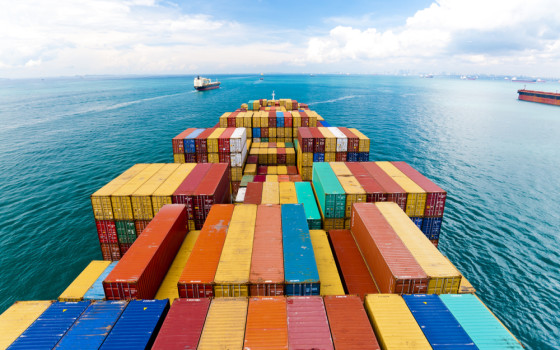
آلية الاتحاد الأوروبي الجديدة للدفاع التجاري لحماية صناعة الصلب..ترحيب في بروكسل ومخاوف في لندن من تهديد وجودي في ظل اكبر ازمة يواجهها القطاع

- Europe and Arabs
- الأربعاء , 8 أكتوبر 2025 8:29 ص GMT
بروكسل ـ لندن : اوروبا والعرب
رحب الاشتراكيون والديمقراطيون في البرلمان الأوروبي بإعلان المفوضية الأوروبية عن آلية جديدة للدفاع التجاري تهدف إلى حماية إنتاج الصلب الأوروبي بشكل أفضل. وقال بيان تلقينا نسخة منه في بروكسل " تُدخل اللائحة الجديدة، التي من المقرر أن تحل محل الضمانات الحالية التي تنتهي في يونيو 2026، حصصًا جمركية خاصة بكل بلد ومنتج لحماية القطاع من المنافسة غير العادلة وزيادات الواردات المفاجئة.
واضاف بيان مجموعة الاحزاب الاشتراكية والديمقراطية "يواجه منتجو الصلب الأوروبيون ضغوطًا هائلة بسبب الممارسات التجارية غير العادلة، وآليات الحماية غير الكافية، والارتفاع الهائل في تكاليف الطاقة. تُغرق الواردات الرخيصة من دول ثالثة السوق، مما يُهدد آلاف الوظائف ومستقبل الصناعة في أوروبا.
بموجب النظام الجديد، بمجرد تجاوز الحصة الحرة، ستخضع الواردات الإضافية لرسوم جمركية أعلى بكثير، تلبيةً للمطالبات القديمة لمجموعة S&D بتعزيز تدابير الحماية التجارية. قد تصل الرسوم الجمركية المفروضة على المنتجات التي تتجاوز الحصة إلى 50%، أي ضعف النسبة الحالية البالغة 25%، بينما سيتم تخفيض الحصص بشكل كبير لتعكس واقع السوق بدقة أكبر.
قالت كاثلين فان بريمبتون، نائبة رئيس التحالف الاشتراكي والديمقراطي لشؤون التجارة الدولية:
"هذه الإجراءات لم تأتِ متأخرة. فهي تُساعد على وقف تدفق الصلب المدعوم بشكل مفرط إلى سوقنا، ولكن هذا لا يعني أن القطاع قد تجاوز الأزمة بعد. تقترح خطة عمل الصلب خفض أسعار الطاقة، وتعديل قواعد المشتريات العامة، وحظر تصدير الخردة، وتعزيز الطلب المحلي على الصلب والألمنيوم الأوروبيين، ومراجعة قواعد المساعدات الحكومية - جميعها إجراءات جيدة. الآن، يجب على المفوضية أن تُطبّق هذه الإجراءات على الفور."
قال بيرند لانج، عضو البرلمان الأوروبي عن التحالف الاشتراكي والديمقراطي لشؤون العلاقات مع الولايات المتحدة
"تُوفر هذه الأداة الجديدة للدفاع التجاري أخيرًا حماية حقيقية للصلب الأوروبي. إنها أكثر مرونةً واستهدافًا وسرعةً في الاستجابة من النظام القديم، حيث تُغلق الثغرات وتمنع التحايل بقواعد أوضح."
"ومع ذلك، هذه مجرد خطوة أولى." في حين يُسهم ذلك في مكافحة المنافسة غير العادلة، يجب علينا أيضًا الدفع نحو أسواق رائدة للصلب الأخضر، وحوافز في الصناعات الرئيسية، وأسعار عادلة للكهرباء لضمان مستقبل قطاع الصلب في أوروبا.
وأضاف براندو بينيفي، منسق التحالف الاشتراكي والديمقراطي في لجنة INTA:
"لطالما دعت مجموعتنا السياسية إلى اتخاذ تدابير أقوى لحماية إنتاج الصلب الأوروبي، الذي يتعرض حاليًا لضغوط شديدة. يُعدّ اقتراح المفوضية خطوة أولى جيدة، ولكن يجب اعتباره بداية لتغيير حقيقي في الوتيرة. ولهذا السبب، سيبدأ البرلمان الأوروبي قريبًا عمله لتعزيز مضمونه. نحن بحاجة إلى أدوات أوروبية أكثر فعالية للدفاع التجاري، قادرة على حماية ليس فقط قطاع الصلب، بل جميع القطاعات المتضررة من فائض الطاقة الإنتاجية وغيرها من التشوهات الخطيرة في تكافؤ الفرص."
واختتم البيان " تُحدد آلية الحماية الحالية، التي طُبقت عام ٢٠١٩ في ظل التعريفات الجمركية الأمريكية على الصلب، سقفًا للواردات بموجب نظام حصص عام، لكنها تفتقر إلى المرونة الخاصة بكل بلد وبالمنتج. تستخدم الآلية الجديدة حصصًا تعريفية مع تخصيصات دقيقة لكل بلد وقواعد منشأ أكثر صرامةً "للصهر والصب" لاستبعاد الصلب ذي المحتوى الصيني الكبير. تتماشى هذه الخطوة مع المفاوضات الجارية بين الاتحاد الأوروبي والولايات المتحدة بشأن فائض الطاقة الإنتاجية للصلب، وتهدف إلى الحفاظ على الامتثال لمنظمة التجارة العالمية من خلال تطبيق المادة الثامنة والعشرين من اتفاقية الجات.
ووفقا لشبكة الاخبار الاوروبية في بروكسل "يورونيوز" أعلن الاتحاد الأوروبي مضاعفة الرسوم الجمركية على واردات الصلب الأمريكية لتصل إلى 50٪، في خطوة وصفها قادة الصناعة بأنها “تهديد وجودي” لصناعة الصلب في المملكة المتحدة.
وتشير البيانات إلى أن نحو 80٪ من الصادرات البريطانية تتجه إلى دول الاتحاد الأوروبي، مما يجعل القطاع يواجه أكبر أزمة في تاريخه، خاصة بعد الرسوم الأمريكية السابقة البالغة 25٪ التي فرضها الرئيس دونالد ترامب في وقت سابق من هذا العام.
قدمت المفوضية الأوروبية خطة تهدف إلى خفض الحصة المعفاة من الرسوم الجمركية وفرض إلزام على الموردين الأجانب بالإفصاح عن مكان صهر وصب الصلب، لمنع دخول المنتجات الصينية إلى السوق الأوروبية عبر دول ثالثة.
وقال ستيفان سيجورني، مفوض الاتحاد الأوروبي للصناعة، خلال فعالية في ستراسبورغ: إن هذه الإجراءات تهدف إلى حماية الصناعة وتمكينها من الاستثمار وخفض الانبعاثات واستعادة قدرتها التنافسية. وأضاف أن القواعد الجديدة تشكل خطوة أساسية في المفاوضات مع الولايات المتحدة لإظهار موقف الاتحاد الأوروبي الموحد ضد إغراق السوق بالصلب الصيني.
تحذيرات من أزمة صناعية في المملكة المتحدة
حذر جاريث ستايس، رئيس الهيئة الصناعية البريطانية ، من أن مضاعفة الرسوم الأوروبية ستؤدي إلى “أكبر أزمة تواجهها صناعة الصلب البريطانية على الإطلاق”، داعياً الحكومة إلى اتخاذ تدابير عاجلة لحماية القطاع من تدفق ملايين الأطنان من الصلب العالمي إلى الأسواق الأوروبية والأمريكية. وأوضح ستايس أن هذه الواردات قد تكون “نهائية للعديد من شركات الصلب المتبقية”. من جهته، وصف ألاسدير ماكديارميد، الأمين العام المساعد في نقابة Community، الإجراءات الجديدة بأنها “تهديد وجودي” لصناعة الصلب البريطانية.
حثت النقابات وقادة الصناعة الحكومة البريطانية على البدء فورًا بمفاوضات مع الاتحاد الأوروبي بشأن حصص الإعفاء الجمركي الخاصة بالدول، خاصة بعد أن أصبحت المملكة المتحدة السوق التصديرية الأولى للاتحاد الأوروبي. وفي الوقت نفسه، تواجه صناعة الصلب الأوروبية تحديات مماثلة بسبب الرسوم الأمريكية الجديدة، وارتفاع تكاليف الطاقة، والمنافسة الصينية الرخيصة، مما يهدد بحدوث انهيار جزئي أو كلي لبعض الشركات. تعتبر صناعة الصلب صناعة استراتيجية، إذ تدخل في جميع البنى التحتية الحيوية، من المباني الشاهقة والسكك الحديدية وتوربينات الرياح إلى الأجهزة المنزلية وأدوات المائدة. ويشير كبار المسؤولين الأوروبيين إلى أن فائض الصلب الصيني يمثل “المشكلة الرئيسية”، وأن الوضع أصبح “غير مستدام ويزداد سوءًا”.
تفاصيل المقترح الأوروبي
في حال المصادقة على الخطة، سيتم خفض الحصة المعفاة من الرسوم الجمركية بنسبة 47٪ لتصل إلى 18.3 مليون طن سنويًا، وهو مستوى لم يُسجَّل منذ 2013، مع فرض رسم بنسبة 50٪ على الواردات التي تتجاوز الحصة.
كما سيُطلب من الدول المصدرة الإفصاح عن مكان صهر وصب الصلب لمنع الالتفاف على العقوبات. وأكد الاتحاد الأوروبي أن النرويج وآيسلندا وليختنشتاين لن تخضع للحصص أو الرسوم الجمركية نظرًا لعلاقاتهم التجارية الوثيقة ضمن المنطقة الاقتصادية الأوروبية.
بالتوازي، يسعى الاتحاد الأوروبي لتشكيل “تحالف للمعادن” مع الولايات المتحدة لحماية الاقتصادات من فائض الإنتاج. وقال هينريك آدم، رئيس مجموعة الصناعة الأوروبية Eurofer: “يجب على الاتحاد الأوروبي التحرك بسرعة وحسم، قبل أن تتعرض أجزاء واسعة من صناعة الصلب وسلاسل قيمتها للانهيار.”












لا يوجد تعليقات